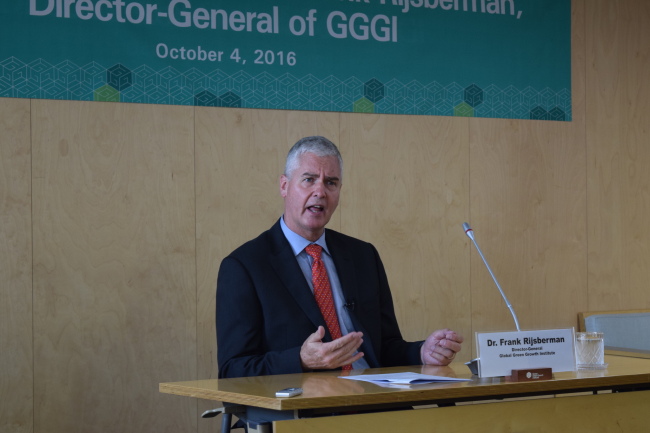Despite its still nascent foray into low-carbon development, the Global Green Growth Institute is seeking to introduce comprehensive planning frameworks for each member country this year, its new chief said Tuesday.
Frank Rijsberman, who took the helm of the Seoul-based multinational organization this week, said that it was ready to capitalize on what is called the GGGI value chain. The chain begins with macroeconomic analyses then progresses to green growth planning, project development and eventually financing.
 |
Frank Rijsberman, the new director-general of the Global Green Growth Institute, speaks during a news conference at its headquarters in Seoul on Tuesday. (GGGI) |
Moving toward the “practical, implementable side” of the value chain, the institution is now working to complete crafting five-year country planning frameworks in cooperation with governments within this year, he said.
“The GGGI is a still young organization. … But very soon people will say ‘OK, you’ve been here long enough, what is the impact?” the director-general said during a news conference at its headquarters.
“The focus that the GGGI now has is very clear. … Within those (frameworks), we work on bankable projects, in terms that produce the most immediate success, and we show the countries developing projects that get finance and are key steppingstones for implementing their visions for green growth to actual projects.”
On Seoul’s initiative, the GGGI was launched in 2010 with the goal of bridging rich and poor worlds by sharing funding and technological know-how for environmentally friendly development.
It has 26 donor and recipient member states, working on 34 programs in 24 countries around the globe.
Until taking up the post, the Dutch-born Rijsberman served for four years as chief executive of the Consultative Group on International Agricultural Research, an association of 15 agricultural think tanks.
He has also built expertise particularly in issues like water management, sanitation and land use through stints at the Bill and Melinda Gates Foundation, Google and the International Water Management Institute, among others.
The former professor and entrepreneur aims to be an evangelist for green growth, stressing the significance of “strong, convincing evidence” of its benefits in persuading skeptics, catalyzing action and mobilizing finances.
“We may even go a step further and advocate for green growth that can increase economic growth, create green jobs, reduce poverty and enhance social inclusion, while at the same time significantly reducing environmental impact,” Rijsberman said.
“There is a strong need for us to further demonstrate that we deliver value for money for our investors.”
With global efforts underway to enforce the climate accord reached last year in Paris, the GGGI is also looking to help developing countries meet their emission reduction targets enshrined in their respective intended nationally determined contributions, or INDCs, he noted.
“Each of these provide often quite aspirational plans of countries,” he said.
“Those are still very recent, but it’s becoming a key part of the work of the GGGI to take those INDCs and come up with more practical action plans toward implementation.”
By Shin Hyon-hee (
heeshin@heraldcorp.com)








